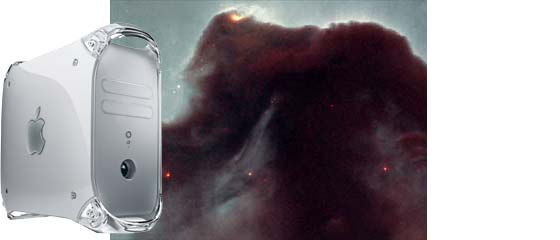
(Up to OJB's General Astronomy Page) Computers and AstronomyMy computer use for the last few years has been increasingly about portability. I take my MacBook Pro (which has a dual code 2.33 GHz Intel processor) with me most places, including on astronomy observing sessions. And now I use my iPhone for more functions if the laptop isn't available or its too inconvenient to use. On the laptop I use Starry Night for creating star maps. I have a program called Dark Adapted which adjusts the brightness and colour of the screen so that it doesn't destroy my night vision. Of course, I often use Photoshop for adjusting the photos I take with my Canon EOS 350D digital camera. On the iPhone I use Starmap and iAstronomica to create star maps and display information about the sky including rise and set times. The latest version of Starmap is really nice because it uses the hardware acceleration to draw the map with stars down to magnitude 10 and it can be zoomed and moved using multi-touch gestures. Older Hardware and SoftwareThis section describes the hardware and software I used during the 1990s and early 2000s. Obviously the technology has moved on since then but a lot of this stuff is still useful and if you have an old machine lying around it can still be used as a useful astronomical tool. I usually use my PowerMac G4 or PowerMac G3 and print the maps I need for observing but I have also used my Powerbook 150 directly with the backlighting turned down. I think maybe a simple astro map program on my Newton would be best of all except the backlighting can't be adjusted and might be too bright. Here are the ways I find computers (Macs) to be most useful for amateur astronomers... Software star-maps which allow you to produce a map of any area of the sky at any time from any place. Many of these include extensive catalogs down to magnitudes dimmer than what most amateur scopes can handle (even the Hubble Telescope catalog is available on CDROM). My favourites are Starry Night and Voyager. These are really nice, useful tools for exploring the sky. The PowerMac version is particularly awesome in its speed of calculating and redrawing the screen, especially on truly spectacular hardware like the G4. Software sky simulators. This function is usually performed by the same type of programs mentioned above, again my favourites are Starry Night and Voyager but Redshift is very good and has even more features than Voyager for this type of work. Running simulations of eclipses from various locations, watching comet orbits, etc is easy with these programs, especially with the awesome calculation speed on a PowerMac. These are great for educational purposes. Showing a class a solar eclipse from the Moon looking at the shadow on the Earth, or from the Sun looking back towards the Moon and Earth makes the whole process much clearer. Image enhancement programs. If you photograph the sky with a digital camera or scan conventional photographs, image enhancement (such as contrast enhancement and unsharp masking) is great for revealing detail you didn't think was there. You can also correct colour distortions and other errors caused by photographic film being pushed beyond its usual limits. General purpose graphic manipulation tools such as Photoshop are good for this, or you can use a specialist image enhancement program like NIH Image. Again these programs really gain from the RISC power of the PowerMac! Databases and catalogs. I store heaps of data in database files which can be searched quickly on any combination of criteria. I find FileMaker Pro and Panorama really useful for this because they are simple to set up, fast and flexible. Internet tools. The Internet is a great way of getting access to the latest astronomical information. Images taken with high-tech "toys" such as the HST are easily accessible and list servers (such as NASA's) are excellent for keeping up to date. If you have any information about useful astronomical tools for the Mac please email me with details. ![[Up]](../XuShared/Up2B.jpeg)
|
||||||||||||